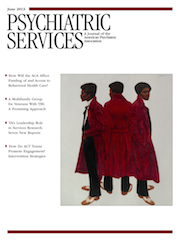Inpatient Psychiatric Care Experience and Its Relationship to Posthospitalization Treatment Participation
Abstract
Objective
This study used factor analysis of a Veterans Health Administration (VHA) survey to identify factors that measure satisfaction with inpatient treatment and to examine the factors’ utility in evaluating treatment participation following discharge.
Methods
The Survey of Healthcare Experiences of Patients (inpatient version) (I-SHEP) was mailed to 34,237 veterans who were discharged from inpatient to outpatient care in the VHA during fiscal year 2009 and was completed by 7,408 patients. A factor analysis of survey responses identified underlying I-SHEP factors and evaluated relationships between the factors, patient characteristics, and attendance at VHA mental health appointments within seven and 30 days of discharge.
Results
The factor analysis identified three domains of satisfaction: respect and caring by nurses–overall hospital impression; involvement and information about care; and respect and caring by doctors. These factors demonstrated good internal consistency (Cronbach’s α=.93, .90, and .94, respectively) and accounted for a moderate amount of variance in patient responses (r2=.167). Only the care involvement and information factor was associated with participation in follow-up care: increased satisfaction (one standard deviation change in scale score) was associated with improved odds of a mental health visit within seven and 30 days of discharge (odds ratio=1.14 and 1.17, respectively, p<.01).
Conclusions
After discharge, persons may not generalize satisfaction about the respect and caring shown by inpatient treatment teams toward their decision to attend outpatient care. Providing patients with information about treatment and involving them in care decisions during inpatient care may help facilitate the transition to outpatient settings.



